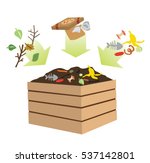Master Organic Composting Techniques for a Thriving Garden

Master Organic Composting Techniques for a Thriving Garden
Organic composting techniques are a gardener's best friend. They transform organic waste into nutrient-rich soil, promoting a thriving garden. Let's dive into the world of natural composting.
What is Organic Composting?
Organic composting is the process of decomposing organic matter, like kitchen scraps and yard waste, into a rich soil amendment. This natural composting method not only reduces waste but also enhances soil health.
The Magic of Garden Compost
Garden compost is like a secret elixir for plants. It improves soil structure, enhances water retention, and supplies essential nutrients. Plus, it's a sustainable and eco-friendly practice.
Understanding Organic Waste
Organic waste includes items like fruit and vegetable peels, coffee grounds, eggshells, and leafy yard waste. These materials are full of nutrients that plants love, making them perfect for composting.
Composting Methods: The Basics
There are two primary composting methods: hot composting and cold composting. Hot composting requires more effort but produces compost faster, while cold composting is more laid-back but takes longer.
Hot Composting: A Quick Cook
Hot composting involves layering green and brown materials, maintaining moisture, and turning the pile regularly. This method can produce compost in as little as a few weeks.
Cold Composting: The Slow and Steady Approach
Cold composting is as simple as piling up organic waste and letting nature take its course. It may take several months to a year, but it's a low-maintenance option.
Balancing Green and Brown Materials
Green materials, like fresh grass clippings, provide nitrogen. Brown materials, like dried leaves, offer carbon. A balanced mix of these is crucial for effective composting.
Avoiding Common Composting Pitfalls
Don't let your compost pile turn into a smelly mess. Avoid meat, dairy, and diseased plants. Also, ensure proper aeration to prevent anaerobic decomposition.
Composting Tips for Beginners
Start small, keep it moist (but not soggy), and be patient. Remember, compost happens! For more detailed guidance, check out this resource from the EPA.
Transforming Your Garden with Compost
Incorporate your homemade compost into your garden beds. Watch as your plants thrive, your soil improves, and your waste reduces.
Conclusion
Mastering organic composting techniques is a rewarding journey. It's not just about creating garden compost; it's about nurturing your garden, reducing waste, and contributing to a healthier environment.
FAQs
- Can I compost meat or dairy products?
- How often should I turn my compost pile?
- What can I do if my compost smells bad?
- Can I use compost on all types of plants?
- How do I know when my compost is ready to use?
0 Response to " Master Organic Composting Techniques for a Thriving Garden"
Post a Comment